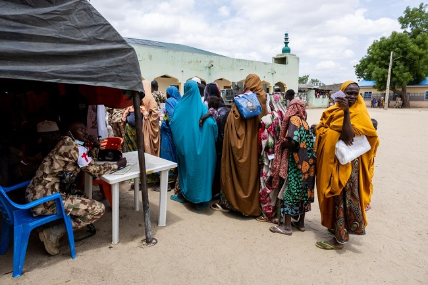FROM above, Monguno looks like a military fortress carved into the desert, surrounded by deep trenches and layers of defences. Located in Nigeria’s conflict-ridden Borno State, the garrison town has become a rare sanctuary in a region still gripped by insurgent violence.
While the insurgents led by Boko Haram and its splinter faction, the Islamic State West Africa Province (ISWAP), have been pushed back from its peak in 2015, attacks on military positions have surged again this year.
Over a dozen army bases in Borno and Yobe States have been attacked or briefly overtaken by militants. Monguno itself was captured briefly in 2015.
Since 2019, the Nigerian military has adopted a controversial strategy of retreating from rural areas and consolidating forces into fortified garrison towns like Monguno. The decision, aimed at protecting troops, has been criticized for ceding vast rural territories to insurgent groups.
Trenches ring Monguno like scars in the sand. Roads leading to the town are carefully monitored. Each day, a route northward toward Lake Chad , the direction from which many attacks come is swept by demining teams.
“We clear this 10-kilometre route daily to detect and remove any improvised explosive devices (IEDs),” said Major Oluwafemi Seyingbo, who leads one of the demining units stationed at the town’s edge.
According to the United Nations Mine Action Service, IED explosions have dramatically increased in the region, with 418 civilian casualties reported in 2024 double the number from the previous year.
At the town’s dozen military checkpoints, soldiers stay alert. “In March, we fought off two heavily armed attacks,” said Major Friday Feekwe. “They came in large numbers, but we held our ground.”
These repeated threats have hardened Monguno’s perimeter. Watchtowers and heavy machine guns dot the barricades, reinforcing the garrison’s role not just as a military outpost, but as a lifeline for displaced civilians.
For many, Monguno has become a last refuge. The Multinational Joint Task Force, comprising troops from Nigeria, Chad, Cameroon, and Benin, maintains a strong presence here. It is this security that draws people fleeing the horrors of war.
“I used to farm land outside town, but Boko Haram destroyed everything,” said Umar Bullam, now back at work near the safety of Monguno’s trenches.
Displaced mother-of-seven, Hauwa Garba arrived two months ago from Niger, where she had taken refuge for 11 years. Her village was attacked in the night. “They killed the adults and took the children,” she said in a whisper. Her daughter, 15-year-old Aisha, remains missing.
Borno State accounts for nearly half of Nigeria’s 3.6 million displaced people, according to the United Nations.
Though Monguno stands strong, experts warn that the war is evolving. In December 2024, insurgents used drones in a deadly strike against Wajiroko military base, the first known use of such technology in Nigeria’s conflict.
“The use of drones marks a dangerous new phase,” warned the Institute for Security Studies (ISS Africa) in a recent report. “If not countered quickly, even relatively secure outposts like Monguno could become targets.”
Vincent Foucher, a researcher with France’s CNRS, says that while Nigeria has succeeded in keeping jihadists from retaking major cities, “it still struggles to project force into remote territories where insurgents remain deeply rooted.”
For now, Monguno remains a fortified island in a sea of conflict, a place where thousands find a fragile peace, even as the war outside grows more complex and more deadly.







